
Final Fantasy XII: The Zodiac Age Review
Final Fantasy XII is an interesting entry in the Final Fantasy series. It mixed series tradition with a lot of experimentation, most of which worked and some that inevitably didn’t. Because it had so many changes to the series’ established roots, it's often seen as the black sheep of the family. Square has given it a new lick of paint with The Zodiac Age edition and finally made it available to PC owners after its PS4 debut last year, so how does it hold up?
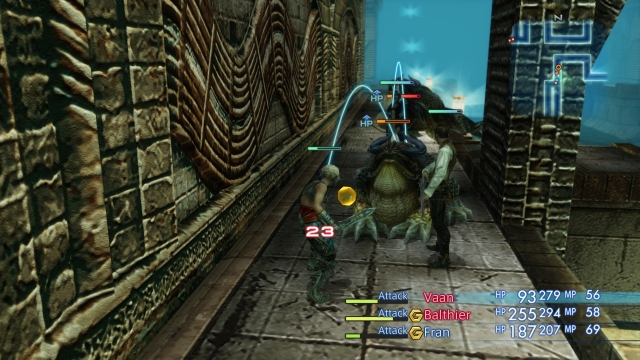
Taking place in the world of Ivalice, which is the setting for a few other Square titles (notably Final Fantasy Tactics and Vagrant Story), the game immediately looks and feels different to any other entry in the main series. This carries through to the plot too - unlike the majority of the series that tend to rely on that hoary old cliche about ‘The Chosen One’ - Final Fantasy XII takes on a political intrigue feel, with a focus on the cast as a whole rather than you as the singular hero. A lot of the story happens around you rather than as a direct consequence of your actions.
The world is in a state of war with Dalmasca’s neighbouring nation states, Archadia and Rozarria, flexing their military might. While the smaller kingdoms of Dalmasca and Nabradia struggle to exist, as the execution of the King of Dalmasca escalates tensions. The game opens with the game’s protagonist, Vaan, living as an orphan on the streets of Rabanastre. He longs to be a sky pirate as he performs basic chores, before being whisked off into a world of adventure as events swoop him along for the ride.
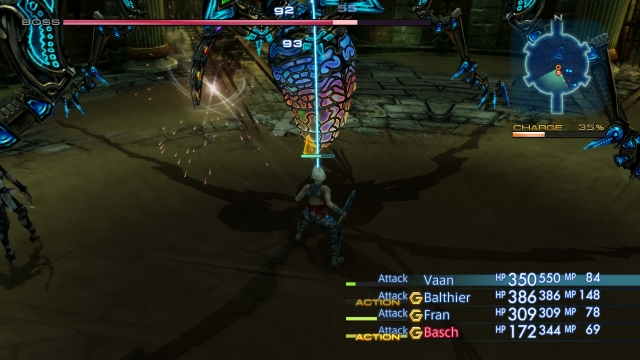
The complex machinations of the kingdoms and the politics that underpin them are what allow the game to feel more fleshed out than other entries have managed, whilst also providing an interesting backdrop for each of the main characters’ personal conflicts and motivations. Unfortunately, it does lead the story at times to feel a little dry or inconsequential as things happen that don’t initially seem to affect our crew of characters as they play out on the wider world. But it all comes right by the end of the story.
The game itself plays much like any Final Fantasy, with familiar enemies and items making an appearance. The world is made up of large open environments with roaming monsters, a fact that is taken advantage of by optional hunting quests which see you tasked with seeking out and eliminating specific enemies. The combination of these things has often seen Final Fantasy XII being compared to an MMO in how it feels.
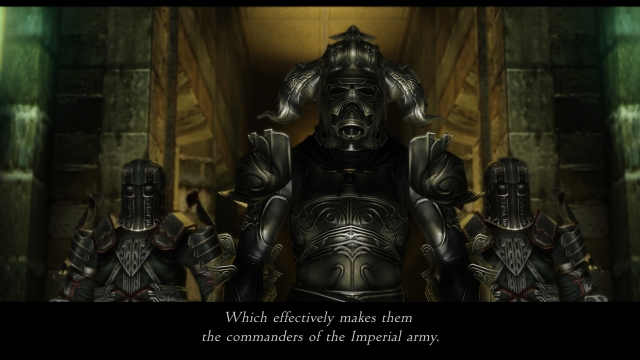
Combat is the major change from prior entries in the franchise. It is still turn-based but allows you to move around the environment in real-time. Actions are still performed when your turn is up, but you have freedom to move out of harm's way or into a stronger attacking position in between actions.
This takes some getting used to, especially if you are coming from a more traditional Final Fantasy. Combined with the game’s Gambit system, which allows you to alter your teammates AI in combat using simple but extremely powerful logical instructions, it becomes a far more engaging way of doing combat, and it’s a shame Square haven’t revisited it since.
So what does the Zodiac Age portion of the remaster’s name signify? Well, Final Fantasy XII got another release in Japan that never came out anywhere else called Final Fantasy XII: International Zodiac Job System which, as well as being a mouthful, featured a lot of changes to the character development system. Characters gain abilities on what is known as a licence board, similar to the Sphere Grid in Final Fantasy X. It allows you to customise your character by buying nodes as you work around the board, allowing you to specialise.
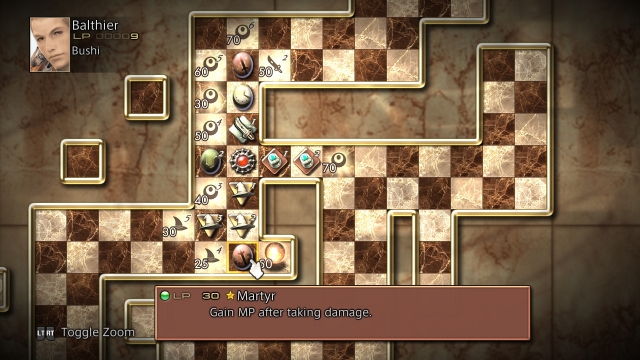
The Zodiac Age includes the changes made to the International Zodiac Job System version of the game, which tossed out the old license boards and instead tied them instead to one of 12 jobs or classes (each representing a sign of the Zodiac, hence the subtitle) that once picked locks you into that archetype. This made it easier to create a balanced group without having to memorise paths on the vast original board, instead providing individual boards for each class. This version also includes the ability to assign a second board, essentially giving you the ability to multi-class.
There are a lot of other smaller changes to the original PlayStation 2 release as well. Again coming from the IZJS edition, Espers (XIIs version of the series’ summon spells) now last longer and some spells are now only obtainable from treasure chests for example. There are a lot of balance and all-round adjustments that fans of the original will notice. These changes make for a more enjoyable game, especially the addition of a “Turbo” button. This allows the game to run at twice or even four times the speed, handy for backtracking or speeding through easy battles.
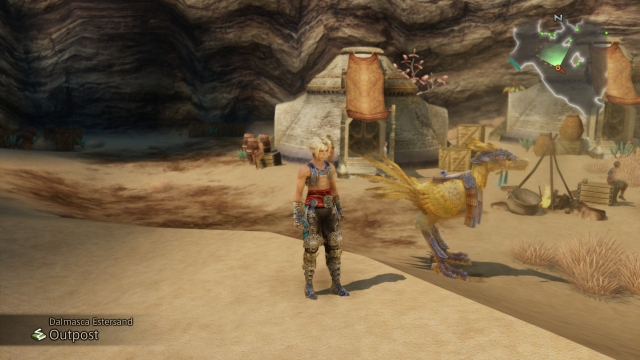
The main changes to Final Fantasy XII: The Zodiac Age though are of course in its presentation. All new artwork, higher resolution textures and new visual effects along with surround sound support freshen up the PlayStation 2 original. It includes multiple soundtrack options including using remixed and orchestral mixes and also allows you to use the Japanese voices should you wish.
These are all welcome additions and make the game still look and sound great after all this time, however there are some oddities. For some reason the cutscenes only occupy two thirds of the screen, with an obnoxious black bar at the bottom (whether you use subtitles or not) and it's oddly distracting when the rest of the game doesn’t have it.
Otherwise, there is very little to fault with this remaster and the PC support for ultra-wide resolutions and 30/60 frames per second cap options should be commended. All the little quality of life additions make the game enjoyable to revisit; simple things like it now featuring an auto-save at certain points make the world of difference.
All in all, Final Fantasy XII: The Zodiac Age brings the game to modern systems in a polished way, giving the visuals and audio enough of a touch-up to stand up to scrutiny whilst staying true to the original. Having the ability to use either Japanese or English voicework and providing soundtrack options are just some of the touches that show the team responsible cared about doing this right.
FINAL FANTASY XII THE ZODIAC AGE (Reviewed on Windows)
Excellent. Look out for this one.
Final Fantasy XII: The Zodiac Age is an extremely solid and polished remaster of the most unusual mainline entry. If you’ve never played FFXII this is the best way to give it a go and if you are a veteran, having the changes from the previously Japan only IZJS version give you another reason to revisit Ivalice.











COMMENTS
Bootus - 04:40pm, 27th February 2018
I disagree with the point Final Fantasy has the 'chose one' cliche. The colourful cast of characters are one of the many things that have made the Final Fantasy series so great, while they have a 'leading wo/man' they aren't in the scope of a chose one. Usually yt? Heroes are just the ones that happen to be around to go against the ever creeping evil. Usually an empire.
pucechan - 06:24pm, 27th February 2018 Author
I dunno, while not as overt as the Dragon Quest games the focus is usually on one character rather than the whole ensemble in most recent entries. The NES and early SNES games not so much but once you hit Terra in FFVI, there is definite emphasis on a sole "special" character with a supporting troupe.
It's not even a bad thing, it's a trope for a reason but FFXII definitely tells a different type of story which is the main point I failed at portraying haha.
Acelister - 06:46pm, 27th February 2018
Arieth, Rinoa, Dagger and Yuna all fit into the "chosen one" category. Yuna is literally chosen to combat Sin.
Bootus - 06:23pm, 1st March 2018
I'll give you Terra. Though she doesn't feature in 6 as heavily as your usual Chosen One character. Same with Aries, while she does have Chosen One traits, same with Cloud, it isn't as overt as the usual troping that happens.
Yuna's more of a chosen many. She's not the only possibility of beating Sin due to other summoners existing. I wouldn't class Rinoa as a chosen one. More the inflicted one.
Acelister - 06:30pm, 1st March 2018
You make my point for Yuna. Out of the many who could battle Sin, she was picked to do so. She was the one chosen, or to put it another way, the chosen one. ;)
Bootus - 05:14pm, 6th March 2018
But Ashe is much more of a chosen one than Yuna. There's other summoners, however Ashe is the only decedent of the Dynast King. Meaning only she is able to claim the power to use the suncrest and the nethacite.